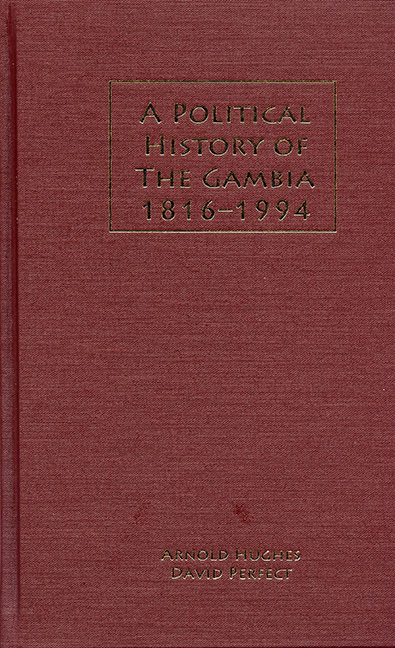Book contents
- Frontmatter
- Dedication
- Map
- Contents
- List of Tables
- List of Interviewees
- Acknowledgments
- Abbreviations
- Introduction
- 1 Social and Economic Setting
- 2 Constitutional Change in The Gambia, 1816–1994
- 3 Merchants and Recaptives: The Origins of Modern Politics, 1816–86
- 4 Patrician Politics in the Era of the Forsters, 1886–1941
- 5 The Establishment of Party Politics, 1941–59
- 6 The “Green Uprising”: The Emergence of the People's Progressive Party, 1959–65
- 7 Electoral Politics, 1965–81
- 8 Radical and Insurrectionary Political Challenges, 1965–81
- 9 Electoral Politics, 1981–94
- 10 The Gambia's External Relations, 1965–94
- 11 The 1994 Coup and the Jawara Legacy
- Appendix A Major Constitutional Changes, 1816–1994
- Appendix B Legislative Council Election Results, 1947–54
- Appendix C General Election and By-Election Results, 1960–93
- Appendix D Presidential Election Results, 1982–92
- Appendix E Republic Referendum Results, 1970
- Appendix F Primary Sources
- Appendix G Newspapers and Magazines Consulted
- Notes
- Bibliography
- Index
- Rochester Studies in African History and the Diasora
3 - Merchants and Recaptives: The Origins of Modern Politics, 1816–86
Published online by Cambridge University Press: 13 April 2017
- Frontmatter
- Dedication
- Map
- Contents
- List of Tables
- List of Interviewees
- Acknowledgments
- Abbreviations
- Introduction
- 1 Social and Economic Setting
- 2 Constitutional Change in The Gambia, 1816–1994
- 3 Merchants and Recaptives: The Origins of Modern Politics, 1816–86
- 4 Patrician Politics in the Era of the Forsters, 1886–1941
- 5 The Establishment of Party Politics, 1941–59
- 6 The “Green Uprising”: The Emergence of the People's Progressive Party, 1959–65
- 7 Electoral Politics, 1965–81
- 8 Radical and Insurrectionary Political Challenges, 1965–81
- 9 Electoral Politics, 1981–94
- 10 The Gambia's External Relations, 1965–94
- 11 The 1994 Coup and the Jawara Legacy
- Appendix A Major Constitutional Changes, 1816–1994
- Appendix B Legislative Council Election Results, 1947–54
- Appendix C General Election and By-Election Results, 1960–93
- Appendix D Presidential Election Results, 1982–92
- Appendix E Republic Referendum Results, 1970
- Appendix F Primary Sources
- Appendix G Newspapers and Magazines Consulted
- Notes
- Bibliography
- Index
- Rochester Studies in African History and the Diasora
Summary
The essence of politics in Gambia during the greater part of the nineteenth century was the interaction between three different interest groups: the officials of the Gambian government; the resident British merchants; and the politically conscious portion of the African population of Bathurst, which consisted largely of Liberated Africans (Recaptives) and their descendants and freeborn Africans from other parts of West Africa. These were not independent political actors, because domestic politics was affected by the views of the Colonial Office, and the opinion of the Sierra Leonean government was also relevant before 1843 and again after 1866.
Until the 1860s, Africans played only a peripheral role in local politics, which was dominated by merchants and officials. The merchants were generally very influential; indeed, in the mid-1860s, they were described as “the ruling power” of Gambia.Thereafter, however, their influence was in decline. In contrast, Bathurst's African population had improved its relative position. This was recognized when a prominent Aku, J. D. Richards, was appointed to the Legislative Council in 1883.
Politics in the Sierra Leone Era: 1816–43
Administration by Commandants: 1816–29
The settlement at St. Mary's had originally been founded as a military post to suppress the slave trade and at first its administration was the sole responsibility of the commandant of the fort, Captain Alexander Grant. Grant was himself answerable to Governor Charles MacCarthy of Sierra Leone. However, as noted in Chapter 1, a civilian population was soon established by the transfer of a dozen or so merchants of British origin from Gorée, following the resumption of French rule in 1817, and from Sierra Leone. Most of these merchants headed small (and frequently unsuccessful) family firms that they ran themselves from Africa. A good example of a (successful) family firm was the one started by Thomas Chown, a former naval captain who remained in Bathurst until his death in 1845; the family business was then taken over by his son, also Thomas, and subsequently by his grandson, Thomas C. Chown. Other merchants who settled in the settlement in its early years included Edward and Richard Lloyd, former military officers who had been stationed at Gorée in the early years of the century; Charles Grant, a cousin of Alexander Grant who arrived from Sierra Leone in 1819; and W. H. Goddard, who moved to Bathurst from Gorée in 1819.
- Type
- Chapter
- Information
- A Political History of the Gambia, 1816–1994 , pp. 55 - 77Publisher: Boydell & BrewerPrint publication year: 2006

